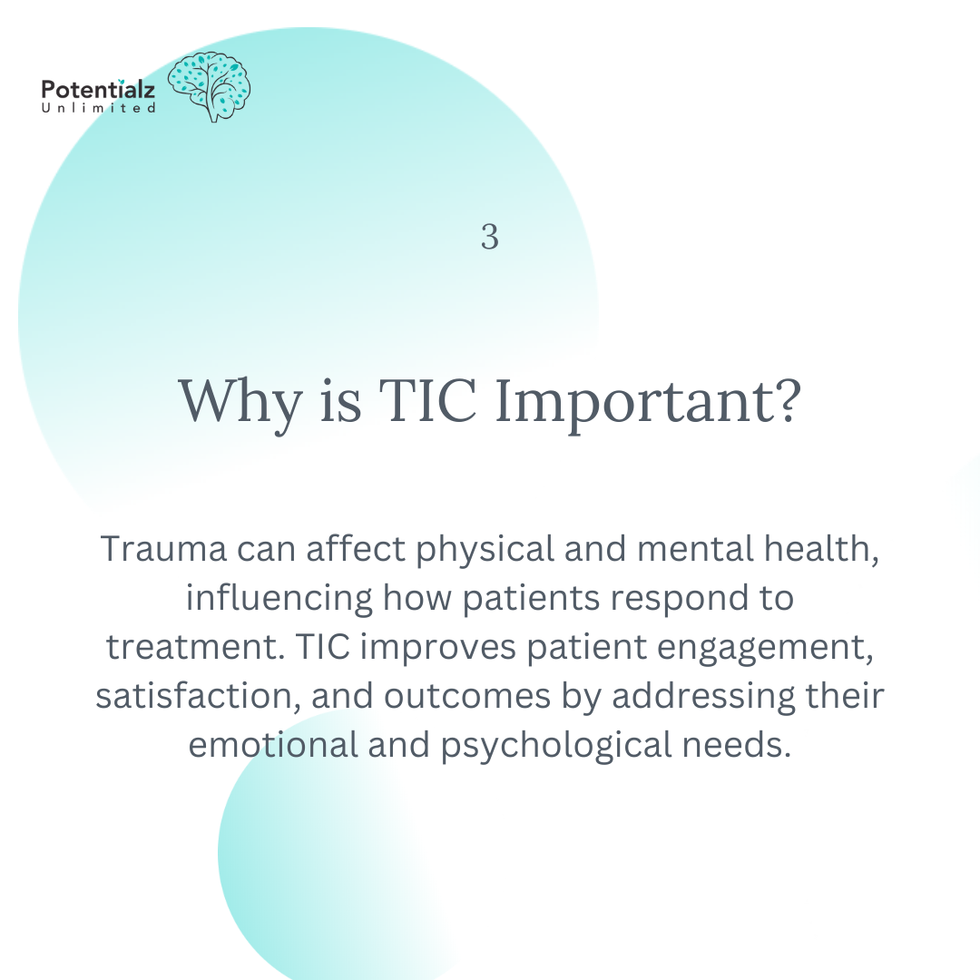The Importance of Trauma-Informed Care
- Gurprit Ganda

- Aug 21, 2024
- 4 min read
Updated: Mar 19, 2025

Introduction: The Importance of Trauma-Informed Care
Ensuring a safe and supportive work environment is crucial for any organization, as it directly influences the well-being and productivity of employees. This is especially important for individuals who have experienced trauma due to workplace accidents. Such events can significantly impact the mental and emotional health of employees, resulting in feelings of anxiety, stress, and even post-traumatic stress disorder (PTSD). It is essential to prioritize implementing trauma-informed care for employees who have gone through traumatic incidents at work to facilitate healing beyond the workplace. This blog post will delve into the principles of trauma-informed care and its application in supporting individuals coping with PTSD following work-related incidents.
Recognizing the Impact of Work Accidents on Mental Health
Workplace accidents can have profound effects on an individual's mental health. Understanding the emotional and psychological ramifications is the first step towards implementing appropriate care. Trauma from these events can manifest in symptoms like anxiety, depression, and PTSD. Acknowledging these impacts is essential for recovery and aligns with the trauma-informed approach of asking "What happened to you?" rather than "What's wrong with you?" (TIO | Trauma Informed Care Principles, 2023).

Understanding Trauma-Informed Care Principles
Trauma-informed care is founded on several key principles: safety, trustworthiness and transparency, peer support, collaboration and mutuality, empowerment (voice and choice), and cultural, historical, and gender issues (What Is Trauma-Informed Care? - Trauma-Informed Care Implementation Resource Center, 2022). Organizations can integrate these principles into their practices to better support employees who have experienced trauma. For example, ensuring physical and psychological safety throughout the organization is paramount in creating a trauma-informed environment (Koury & Green, 2022).
Creating a Safe Space for Healing
A supportive environment is crucial for recovery. Strategies for creating safe spaces at work include providing quiet areas for reflection, encouraging open communication, and fostering a culture of empathy and support among team members. Safe spaces promote trust, risk-taking, and self-expression (Hendricks et al., 2014), enabling employees to voice opinions without fear (Gray, 2020; Morath & Leary, 2004).This aligns with the principle of safety in trauma-informed care, which emphasizes that staff and the people they serve should feel physically and psychologically safe (TIO | Trauma Informed Care Principles, 2023).
Training Staff on Trauma Awareness
Training staff on the effects of trauma and the importance of trauma-informed care is essential. Effective training programs should help coworkers and management understand how to support their peers who may be struggling with PTSD. This training should emphasize that everyone in the organization has a role to play in a trauma-informed approach, as highlighted in the principle of collaboration and mutuality (What Is Trauma-Informed Care? - Trauma-Informed Care Implementation Resource Center, 2022).
Encouraging Open Dialogue
Open and honest communication is a cornerstone of healing. Techniques for encouraging open dialogue around trauma and mental health can help destigmatize these conversations and create a culture of support within the workplace. This aligns with the principles of trustworthiness and transparency, as well as empowerment, voice, and choice (TIO | Trauma Informed Care Principles, 2023).
Providing Access to Professional Support
Access to professional mental health support is vital for employees recovering from trauma. Offering Employee Assistance Programs (EAPs), counseling services, and connections to external mental health resources can aid in recovery. This approach supports the principle of peer support and mutual self-help, which are integral to the organizational and service delivery approach in trauma-informed care (What Is Trauma-Informed Care? - Trauma-Informed Care Implementation Resource Center, 2022).
Monitoring Progress and Adjusting Care Plans
Trauma recovery is not linear, and ongoing support is crucial. Monitoring an employee's progress and adjusting care plans as needed ensures they receive appropriate support throughout their healing journey. This approach embodies the principle of empowerment, voice, and choice, recognizing that every person's experience is unique and requires an individualized approach (TIO | Trauma Informed Care Principles, 2023).
Conclusion: Building a Trauma-Informed Workplace Culture
By embracing a trauma-informed approach to care, organizations can significantly improve the healing process for employees affected by work accidents. Creating a supportive workplace environment not only benefits employees but also enhances overall workplace morale and productivity. Together, we can foster a culture of understanding and resilience that promotes healing beyond the workplace.
Implementing trauma-informed care principles in the workplace is a commitment to not repeating traumatic experiences and, in whatever way possible, restoring a sense of safety, power, and self-worth among employees (TIO | Trauma Informed Care Principles, 2023). By doing so, organizations can create an environment where healing is possible and employees feel supported in their recovery journey.
References
Gray, G. A. (2020). Creating safe spaces - accelerating change by unlocking the full potential of employees. Academy of Management Proceedings, 2020(1), 20349. https://doi.org/10.5465/ambpp.2020.20349abstract
Hendricks, K. S., Smith, T. D., & Stanuch, J. (2014). Creating safe spaces for music learning. Music Educators Journal, 101(1), 35–40. https://doi.org/10.1177/0027432114540337
Koury, S. P., & Green, S. A. (2022). Creating Trauma-Informed Long-Term care organizations. Caring for the Ages, 23(2), 10–11. https://doi.org/10.1016/j.carage.2022.01.003
Morath, J.M., & Leary, M. (2004). Creating safe spaces in organizations to talk about safety. Nursing economic$, 22(6), 344-51, 354 .
TIO | Trauma Informed Care Principles. (2023, August 19). Trauma Informed Oregon. https://traumainformedoregon.org/resources/new-to-trauma-informed-care/trauma-informed-care-principles/
What is Trauma-Informed Care? - Trauma-Informed Care Implementation Resource Center. (2022, July 7). Trauma-Informed Care Implementation Resource Center. https://www.traumainformedcare.chcs.org/what-is-trauma-informed-care/














Comments